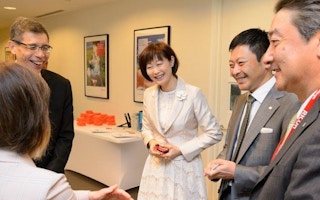Masayo Hada, a long-serving member of Japanese printing and electronics firm Ricoh’s sustainability team, has joined snacking giant Mondelez International.
To continue reading, subscribe to Eco‑Business.
There's something for everyone. We offer a range of subscription plans.
- Access our stories and receive our Insights Weekly newsletter with the free EB Member plan.
- Unlock unlimited access to our content and archive with EB Circle.
- Publish your content with EB Premium.
Hada brings to an end 14 and a half years with Ricoh Asia Pacific, where she was deputy senior manager, regional environmental management group, running functions such as emissions reduction, environmental labelling, and recycling standards. She was one of the key figures behind Eco Action Day, Ricoh’s annual environmental awareness campaign.
Hada joins the maker of brands including Oreo, Ritz, Toblerone and Cadbury as senior manager, environment and sustainability, Asia Pacific, Middle East and Africa. She will continue to be based in Singapore.
She joins a company with a number of high-profile sustainability commitments, including a 10 per cent carbon emissions cut by 2025, packaging recyclability by 2025, and Roundtable on Sustainable Palm Oil certification of all the palm oil it uses.
At Ricoh, Hada’s duties have been taken on by Wong Yee Thing, another long-serving employee who has been with the firm since 2010. Wong is now manager of the regional environmental management group for Australia, New Zealand, Singapore, Malaysia, Hong Kong, Taiwan, Thailand, Philippines and Vietnam.
Hada joined Ricoh from Panasonic, where she worked on the electronics firm’s environment programme, in 2005. She has also worked at the National University of Singapore as a programme manager, and earlier in her career interned with childen’s charity Unicef in Boston in the United States.














